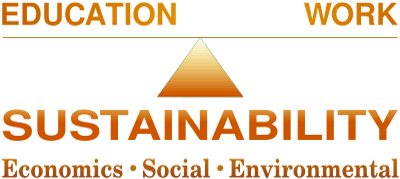
SUSTAINABILITY
In 1980 the "Triple Bottom
Line" concept, by John Ekington, known as PPP, emerged from the cooperative finance sector.
Today, thirty years later, it still seems difficult, and even strange, to try to integrate aspects
which are clearly educational and cultural with agricultural, even those related to Environmental
Protection. And what about art? Are these ubiquitous realities? There is so much work to do in this area
yet so many consider themselves "Experts" in Sustainability. There is so much work to be done until
the rhetorical connotations disapate leaving a QUALITY based methodology for the sake of AGRICULTURE.
Sustainable Development was recognized by the United Nations in 1987 by the Brundland Report (1987) as
the following:
"A development which tries to satisfy the needs of the present generation without
compromising the capacity of future generations in satisfying their own needs, allowing people, today and
the future, to achieve a satisfactory level os social and economic development and human and cultural
well-being, while utilizing the earth's resources responsibly so as to preserve its species and natural
habitats."
- Economics read...
-
The economical factor is only one of three aspects intrinsically bound to projects of a long duration.
Economic decisions are made in a continually changing environment and applied to society as a whole from
which it is not disassociated. Psychological phenomenae like that of Motivation surpass the
strictly monetary theory of Economics. Projects which place the persons envolved, or their habitat,
in second place are ephemeral and condemned to external economic intervention for their continuance.
Why, after the preexisting social fabric of a culture such as the environment where it exists?
- Social read...
-
The social factor focuses on the project's workers. It is obvious that a worker worried about nutrition,
health, security, and without access to information or cultural instruction will always be a poor
quality employee, and one who only executes the job at hand because there is no other option.
Such an employee will quickly quit the job if given another option. The duration and productivity
invested by a worker is based on the degree to which this person is dependent on the monetary incentive,
and not on any other social nor environmental criteria, neither interest nor motivation.
First the basic necessities must be satisfied, i.e., the farmer might not need money but rather water
that is drinkable??
- Environmental read...
-
The environmental factor is the pillar which supports the project economically and socially. Even
though the HUMAN BEING is the primary RESOURCE management of natural resources non-postpone able,
non-negotiable, and indispensable.
Curiously, many excellent environmental projects were short-lived because they were not socially nor
economically sustainable. We can also see that 30 years after the "Triple Bottom Line" that
environmental projects which persevere are those which contribute to social improvement.


